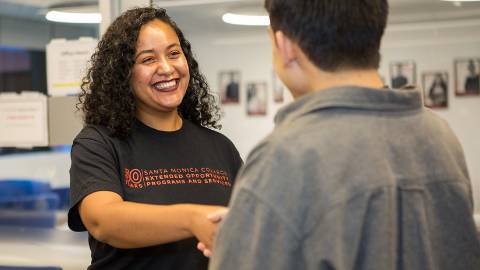It is okay to be a little nervous during an interview. Everyone experiences nervous feelings during an interview. Try to stay focused and remember what you practiced. Still nervous? Try taking slow, deep breaths to help you relax. Here are some suggestions to help you during your interview.

Arrive Early
Always give yourself extra time. You don’t want to be late because of unexpected traffic, street closures and/or traffic accidents. Plan to arrive at least 15 to 20 minutes early to give yourself a buffer and to use the restroom. Arriving early will allow you some time to remove animal hair, shoulder flakes, check for static, wash clammy hands, etc. Consider checking in only 5 to 10 minutes before your scheduled interview time. Leave your coffee or soda in the car.

Technology
Turn off or completely silence your phone. Everyone can hear a phone vibrating. This is different than completely silencing your phone. Stay off any forms of technology while you are waiting to be interviewed. Use this time to focus on your interview.

Greetings and Handshakes
Treat everyone you encounter like an interview. Don’t forget to always smile. Remember, you need to demonstrate that you fit with the organization and smiling helps to convey that you’re friendly and approachable. Hiring managers may also ask other staff to share their impression of you. Treat everyone as if you are being interviewed. Always stand to greet someone. Practice giving a firm handshake with others. Make sure it represents what you want to convey to the interviewer(s). You should shake hands with everyone you meet as well as at the end of your interview. When you have the opportunity, write down the names and titles of anyone that interviews you, so you can follow up with a thank you note to each interviewer. Always wait to be seated.

Be Genuine
Be concise and to the point, yet sincere in your responses. Your answers should be authentic. Do not lie about or exaggerate any aspects of your education or experience. You should be the best version of yourself. Remember, to have a professional conversation. If you mess up, you can acknowledge it and correct it. Always be positive in your communication and attitude. Do not speak negative of past employers. Remember you are trying to sell yourself. Communicate clearly and avoid any grammar errors or use of profanity. Steer clear of expressions such as “like,” “um,” “uh,” “yeah,” and “you know.” It is okay to pause briefly and collect your thoughts before responding to a question. Don’t be afraid to ask for clarification on a question. Never answer a question with just “yes’ or “no.” Always elaborate. You always to make sure you answer each question clearly accurately but not give an answer that is too lengthy. Think STAR (opens in new window) .

Be Engaged
Listen carefully to the questions and comments from employers. Show interest in the interview by smiling, nodding as well as using other verbal/non-verbal cues. Sit up straight, lean slightly forward towards the interviewer and make frequent eye contact with those interviewing you. Do try to avoid slouching, fidgeting, playing with your pen or other objects, leaning too far back, crossing arms, finger tapping, cracking knuckles, yawning, touching your hair/face, etc.

Ask questions
This is your opportunity to show your interest in the job and company. Visit our sample questions you can ask an employer during your interview (opens in new window) .

Next Steps
If the employer doesn't mention the next steps following your interview, be sure to ask. You want to know what the next steps are in the interview process and when they might occur.

Express Thanks
Don't forget to thank the interviewer for their time and consideration. Also, if possible, make sure to thank anyone else who helped you on the way out.


